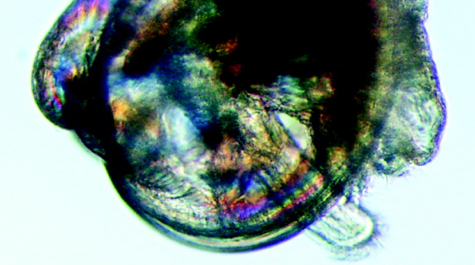"The time has come," the Walrus said,
"To talk of many things:
Of shoes--and ships--and sealing-wax--
Of cabbages--and kings--
And why the sea is boiling hot--
And whether pigs have wings."
- Lewis Carroll
The Walrus and The Carpenter
The little oysters on the west coast are rapidly disappearing. Not due to walruses or carpenters but due to climate change. The sea may be increasing in temperature, but is the increase in acidification (drop in pH due to higher levels of CO2) that is really doing the damage. There have been numerous lab experiments that have shown that increased CO2 in the atmosphere causes changes in larval development in many marine species. These changes can be positive, neutral or detrimental depending on the experimental set up and the species tested. These variable results may leave questions for policy
 |
| (c) VIMS |
For multiple years, wild oysters off the shore of Washington and Vancouver have failed to reproduce successfully. The shells of the tiny larvae could not form in the increasingly acidic waters. This was also seen in nearby hatcheries that provide the seed (young oysters) that supplies oyster farmers and restoration efforts. Whole crops of baby oysters were failing, despite meticulous rearing efforts. Oyster farming generates over $200 million of economic revenue along the West Coast.
Hatcheries have found ways to monitor the seawater acidity and buffer it - the equivalent to adding TUMS (or other antacid) to appease an acidic stomach after an extravagant meal. With these additional efforts, oyster seed remains available for the farmers. However, this does not solve the problem in the wild which continues to worsen.
Northwest oyster die-offs show ocean acidification has arrived. E. Grossman. Yale Environment 360.

No comments:
Post a Comment